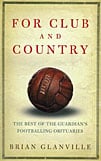 The Best Of The Guardian’s Footballing Obituaries
The Best Of The Guardian’s Footballing Obituaries
by Brian Glanville
Guardian Books, £12.99
Reviewed by Taylor Parkes
From WSC 264 February 2009
The first real heavyweight of British sports journalism, and the only one to have contributed sketches to That Was The Week That Was, Brian Glanville remains something of a national treasure. His eloquent, sharply cynical style, drenched in arcane phraseology, literary allusions and brutally condescending wit, highlights the enduring lack of personality in football writing (at least, the kind of personality you’d want to sit next to at dinner). Any writer who believes that football and intelligence need not be mutually exclusive – at least not all the time – owes him a large debt of gratitude. This collection of obituaries from the pages of the Guardian is not the best platform for Glanville the stylist, but a fine showcase for his strengths as a journalist: that astonishing, exhaustive knowledge of football history, an eye for detail, and the ability to pack each paragraph with information while keeping the prose clean, clear and eminently readable.
Having written countless retrospective articles in recent years, Glanville has – perhaps by necessity – developed a tendency to repeat himself somewhat, and inevitably we find many of the same stories here, phrased almost identically to this-or-that piece from the past decade. Entries on major figures such as Brian Clough (“tell them what I said, Brian”) or Ferenc Puskas (“like a fire engine going to the wrong fire”), while predictably solid and informative, offer little that’s new. But this is not the function of an obituary – and Glanville is a superb, highly diligent obituarist, placing each life in context, with a precise and authoritative tone well-suited to the form. Even those characters he’s spent half his life excoriating get (relatively) respectful, even-handed treatment: Alf Ramsey is, in death, spared a retelling of that favourite anecdote (the one whose punchline is “no thank you, I don’t want no dinner”), while Italo Allodi, the corrupt Italian bigwig Glanville has described elsewhere as “the dirtiest trickster of them all… a filthy liar” (and whom he investigated personally in the 1970s) gets a pursed-lipped send-off, humming with fury yet impeccably restrained.
Most enjoyable are the shorter, fresher pieces on relatively obscure players: men such as Oscar Heisserer, the “valiant Alsatian” who defied the SS, or Ray Bowden, a Cornish forward of the 1930s, who perfected his two-footedness by “hopping on one leg all the way to school, then hopping all the way home on the other” (and who was distraught at being drafted into the first team at Plymouth Argyle, as it meant “putting a married man out of a job”). There’s genuine affection here, an appreciation of football’s less self-serving past which, while somewhat keening, rarely descends into sickly nostalgia. It’s here, well off the beaten track, that the book is at its most rewarding.
What’s more, since the decade or so it covers saw the loss of so many significant figures, this is rather more than a collection of short essays: it is, effectively, a brief history of football in the middle third of the 20th century, told through the lives of its heroes and villains. Primarily a work of reference, it’s an uncommonly absorbing read in its own right.